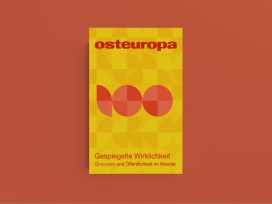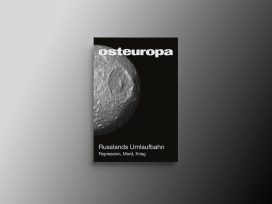Abstracts Osteuropa 7/2007
Georg Vobruba
A Critique of the Criticism of Europe. The Intellectual Perspective on European Integration
European integration determines everyday life in Europe. But there is little intellectual criticism of it, for all of the simple perspectives have already been taken. If intellectuals praise the EU for peace and prosperity, then they merge with the European elites. If they criticise concrete forms and consequences of EU policy, they risk disappearing between the apprehension of the people and its exploitation by populists. An intellectual criticism that is divested of society in the same way as critical theory ends up ensnarled in the positions of other actors for that very reason. Only a sociology of criticism that conveys social fears in formal constitutive ideas can provide the basis for an intellectual perspective.
Ludger Helms
The Political Cultures of Eastern Europe. Variety and Difference
Democracies rely not only on capable institutions, but above all on the support of their citizens as well. A comparison of the values and attitudes as well as the extent of engagement in civil society on the part of the citizens of central eastern and eastern European countries brings to light considerable differences between individual countries. By contrast, international comparisons including additional dimensions heighten one’s awareness of the commonalities and particularities of eastern Europe’s post-communist systems. The development of political culture in the states of central eastern Europe is grounds for cautious optimism.
Susanne Schattenberg
“Conversation Between Two Deaf-Mutes”? The Culture of Khrushchev’s Foreign Policy and Adenauer’s Moscow Visit in 1955
Foreign policy is usually treated as realpolitik in which hard facts alone play a role. Diplomacy, however, is intercultural communication. Adenauer’s visit to Moscow shows just how difficult it was for East and West to understand one another. Even Western diplomatic protocol could not serve as a common language, for the Soviet Union rejected it as a bourgeois product. Finally, Adenauer engaged in Khrushchev’s yelling and threats, and that made a decision possible.
Claudia-Yvette Matthes, Monika Kacinskien, Feliciana Rajevska, Anu Toots
Pension Reform in the Baltics. New Models Tested in Practice
Since the implementation of pension reform in the Baltic states several years ago, some successes have taken shape in a number of areas. The pension system was relieved in financial terms, and black market activity has been contained. The new pension funds, which are covered by capital and offered in all three countries alongside the old-age provisions funded by shared financing, are enjoying considerable popularity and have so far brought high returns. Alone old-age poverty, which has hit many pensioners in Latvia and, to a lesser extent, in Lithuania, could not be remedied by pension reform. In this respect, there is still need for further reform.
Tobias Hausotter, Arne Niemann, Alexander Schratz
The European Union’s Belarus Policy. Manoeuvring Room and Policy Options
The EU wants to democratize Belarus, but its influence is limited. The development of a partnership within the framework of the European Neighbourhood Policy is at the moment unthinkable, for the authoritarian regime of Aliaksandr Lukashenka does not share the values that form the basis of the ENP. Sanctions and incentives for cooperation have so far had only a limited effect and must therefore be supplemented. Above all, Belarusian civil society must be given greater support. Furthermore, the EU should coordinate its policy better with other international actors.
Gulbaat Rzchiladse
Russia and Georgia. Confrontation Instead of Cooperation
Since the mid-1990s, radical Islamism and international terrorism have found fertile ground in Chechnya. Militant Islamism represents a threat not only for Russia but also for Georgia. The destabilisation of the region and a strengthening of Islamists in the northern Caucasus are of no advantage to either country. Moscow and Tbilisi are actually natural allies in this question, and there are other very serious arguments for cooperation. In reality, however, both sides are relying on confrontation and fuelling the flames of their conflict.
Lara Sigwart
The South Ossetia Conflict. Escalation after the Rose Revolution
After coming to power in the Rose Revolution of 2003, Georgian President Mikhail Saakashvili announced that he would resolve the conflict in South Ossetia. However, he did not have in mind a new offer for the local rulers. In fact, he wanted to strengthen Georgia’s central government. To that end, he sought backing from the West, in particular the United States. South Ossetia, however, is still supported by Russia. What followed was an escalation of violence.
Fabrice Larat
A Life for Cultural Freedom. François Bondy and Europe’s Unity
François Bondy was a European through and through. He was born in 1915 in Berlin, the son of a Jewish-German family. His father came from Prague, his mother from Hungary. Bondy spent his childhood in Switzerland. As the editor-in-chief of the magazine Preuves, he contributed to the cultural and political unification of Europe over the course of his long life. In unification, Bondy saw the only possibility of overcoming western Europe’s totalitarian inheritance and eastern Europe’s totalitarian present. He was one of the few who did not lose sight of the unity of the entire continent during the East-West conflict.
Karlheinz Kasper
Invocations of Reality. Russia’s Literary Prizes at the Crossroads?
For a long time, the Russian literary prizes that were created in the 1990s had a bad reputation. Apart from the fact that they were repeatedly connected with scandalous decisions and influenced by literary struggles over direction, they gave rise to doubts as to whether the highly decorated works really possessed first-class aesthetic qualities and the kind of social relevance expected from outstanding artistic achievements. The longstanding practice of ignoring works that were socially and politically explosive seems to have been broken. The great literary prizes for 2006 confirm that the increasing tendency of the Russian novel towards politicization is finding resonance in jurors’ decisions. The novel 2017 by Ol’ga Slavnikova and San’kia by Zakhar Prilepin are perfect examples of this. After the demise of the Soviet Union, it appeared as if literary life in Russia could be promoted mainly by new literary prizes no longer managed by the state. The media praises the institutionalization of the Buker (which, like its role model, the British Booker Prize, is supposed to be awarded to the best novel of the year), the creation of the Triumf (which is to recognize high achievements in all areas of the arts), and the establishment of countless other prizes.
Published 27 July 2007
Original in German
Contributed by Osteuropa © Osteuropa
PDF/PRINTNewsletter
Subscribe to know what’s worth thinking about.



